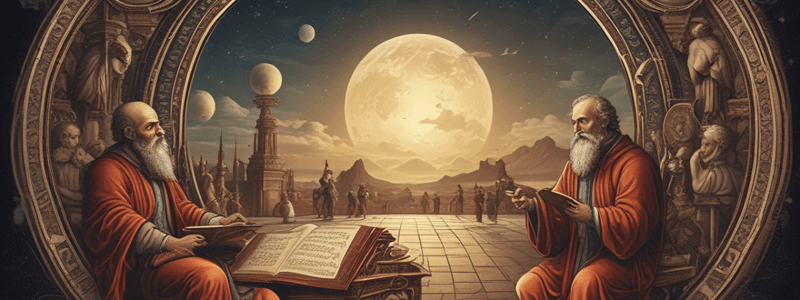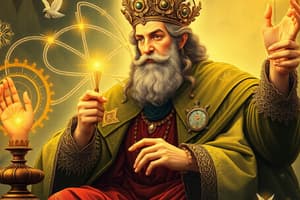Podcast
Questions and Answers
Who is credited with beginning what became known as the Scientific Revolution with his discoveries?
Who is credited with beginning what became known as the Scientific Revolution with his discoveries?
- Eratosthenes
- Galileo Galilei (correct)
- Aristotle
- Ptolemy
What theory of the Universe, regarding the position of the Earth, lasted for about 2000 years?
What theory of the Universe, regarding the position of the Earth, lasted for about 2000 years?
- Geocentric (earth-centered) (correct)
- Heliocentric (sun-centered)
- Ptolemaic (planet-centered)
- Copernican (Earth and planets orbiting the Sun)
Which ancient astronomer measured the circumference of the Earth to be around 25,000 miles?
Which ancient astronomer measured the circumference of the Earth to be around 25,000 miles?
- Ptolemy
- Copernicus
- Eratosthenes (correct)
- Aristotle
Why did scientists begin to question the Geocentric Model of the universe?
Why did scientists begin to question the Geocentric Model of the universe?
Who developed the Heliocentric model of the Universe?
Who developed the Heliocentric model of the Universe?
What concept enforced by Church teachings was challenged by medieval astronomers' use of epicycles in explaining planetary motion?
What concept enforced by Church teachings was challenged by medieval astronomers' use of epicycles in explaining planetary motion?
Which astronomer wrote 'On the Revolutions of Heavenly Bodies' in 1543?
Which astronomer wrote 'On the Revolutions of Heavenly Bodies' in 1543?
Who developed the planetary laws of motion in the 1620s?
Who developed the planetary laws of motion in the 1620s?
Which astronomer improved the telescope and published 'The Starry Messenger' in 1610?
Which astronomer improved the telescope and published 'The Starry Messenger' in 1610?
In 1632, who wrote 'A Dialogue Concerning Two Chief World Systems' that poked fun at the Church?
In 1632, who wrote 'A Dialogue Concerning Two Chief World Systems' that poked fun at the Church?
Study Notes
The Scientific Revolution
- Began with Galileo Galilei's discoveries, known as the father of the Scientific Revolution
- Marked a new way of understanding the world and the heavens
Geocentric Universe Model
- Believed the Earth was at the center of the universe
- Lasted for about 2000 years
- Supported by Aristotle (c. 500 BCE) and Ptolemy (c. 100 CE)
- Eratosthenes measured the circumference of the earth, approximately 25,000 miles (actual 24,860 miles)
- View was enforced by Church teachings, with the Earth having a special place chosen by God
- Medieval astronomers used epicycles to explain planetary motion, which led to questioning the Geocentric model
Heliocentric Model of the Universe
- Aristarchus of Samos proposed a heliocentric model c. 300 BCE
- Nicolaus Copernicus studied planetary motions for 20 years and wrote "On the Revolutions of Heavenly Bodies" (1543)
- Tycho Brahe collected observational data, but lacked understanding
- Johannes Kepler developed planetary laws of motion:
- Planets move in elliptical orbits with the Sun as a focus
- A planet covers the same area of space in the same amount of time
- A planet's orbital period is proportional to the size of its orbit (semi-major axis)
- Isaac Newton's laws of motion explained Kepler's discoveries
Telescopes and Observations
- The Telescope was first developed by Dutch sailors
- Galileo Galilei improved the telescope in the 1600s
- Published "The Starry Messenger" in 1610, featuring observations that:
- Fractured deeply held beliefs in the geocentric universe
- Jupiter had 4 moons: Callisto, Ganymede, Io, Europa
- The sun had sun spots
- The moon had a rough, uneven surface
Galileo and the Church
- In 1616, the Catholic Church warned Galileo not to teach or support Copernicus's teachings
- Galileo wrote "A Dialogue in Concerning Two Chief World Systems" in 1632, poking fun at the Church and written in Italian
- In the dialogue, Galileo made Simplicio represent the Church as 'not very intelligent'
Studying That Suits You
Use AI to generate personalized quizzes and flashcards to suit your learning preferences.
Related Documents
Description
Learn about the Scientific Revolution and how Galileo Galilei's discoveries contributed to it. Explore how this period changed our perspective on nature.




